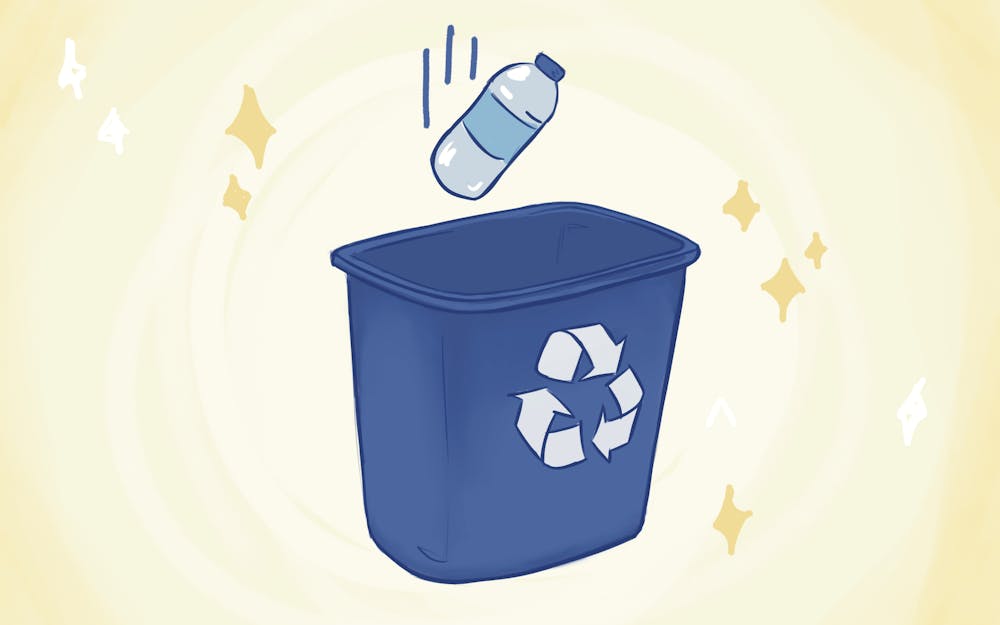Since I was a kid, the recycling bin has been a constant presence in my life. My parents taught me from a young age which items to recycle. Doing the dishes always included rinsing out the plastic containers our groceries came in. Even to this day, I’m shocked whenever I ask a friend where to recycle a can at their house and only receive a blank stare.
Over the years I’ve been recycling, I’ve always met people who don’t see the point. It’s too time-consuming and costly, they say. It’s too difficult to find out what is recyclable. Lately, it’s been a different refrain, mostly from people my age: it’s pointless.
The main thought behind this is hard to dispel — even if I recycle everything I can, I’ll never make up for the sheer amount of carbon emissions and waste released by massive companies.
Which is true. Only 57 oil, gas, coal and cement producers have caused 80% of the world’s global fossil fuel related carbon dioxide emissions since 2016. Trying to offset that with recycling on our own is like spraying a garden hose at a raging inferno. It’s a nice gesture, but will never solve the problem on its own.
But I don’t fully agree with this thought process. Yes, it’s true that our individual actions don’t hold a candle to the overall environmental devastation being caused, but that doesn’t mean we should just stop altogether. Why can’t we speak out against the worst exploitations of our planet and also throw that plastic water bottle in a recycling can?
The mantra of “reduce, reuse, recycle” has been pounded into my head for two decades now, but I can’t help but feel like there’s some truth to those words. U.S. plastic waste was estimated at 73 million metric tons in 2019 — 485 pounds per person. If each of us can reduce what we toss by just a bit, we could make a good dent in our waste production.
Over 5 trillion pieces of plastic are floating in the world’s oceans. If we mean to reduce our environmental impact and save vulnerable wildlife from human impact, we need to find ways to repurpose our waste instead of dumping it. Plastic takes between 50 and 200 years to decompose — and when it does break up, it just becomes smaller pieces and doesn’t reabsorb into the environment.
Along with this, 11.3 million tons of clothing also made their way into landfills in 2018. Our waste doesn’t just come from plastic. Using what clothes you already have and donating what you don’t need can help reduce this waste. “Reuse” is in that slogan for a reason.
Use of recycling and composting municipally has increased during the last decade. In 2018, these efforts saved over 193 million metric tons of carbon dioxide emissions. Recycling doesn’t just keep our land clean, it also helps our atmosphere recover.
Both Bloomington and IU’s campus offer recycling services, which also list what can and cannot be recycled. Recycling is no longer a niche activity that only the biggest Earth Day fans take part in — it’s something we all can do with barely a second thought.
Sure, none of us are perfect — I find myself putting a clearly recyclable item into the trash sometimes out of pure laziness. And, of course, even if everyone turned around and started recycling today, it wouldn’t fix everything. Landfills won’t clear up overnight. Our atmosphere won’t cool down instantly.
But no matter how gauche and pointless recycling may seem, it’s something we can actually do. Each time I toss something into the recycling instead of the trash, I feel a little bit of pride. I can’t solve our climate crisis, but maybe I can help just a bit. And if we all help just a bit, that bit turns into a lot.
Danny William (they/them) is a junior studying cinematic arts.






